Did ex-crime reporter Jigna Vora pay a deadly price for professional ambition when she was named key accused in the killing of a fellow journalist? The muse, the actor and the maker in conversation with mid-day
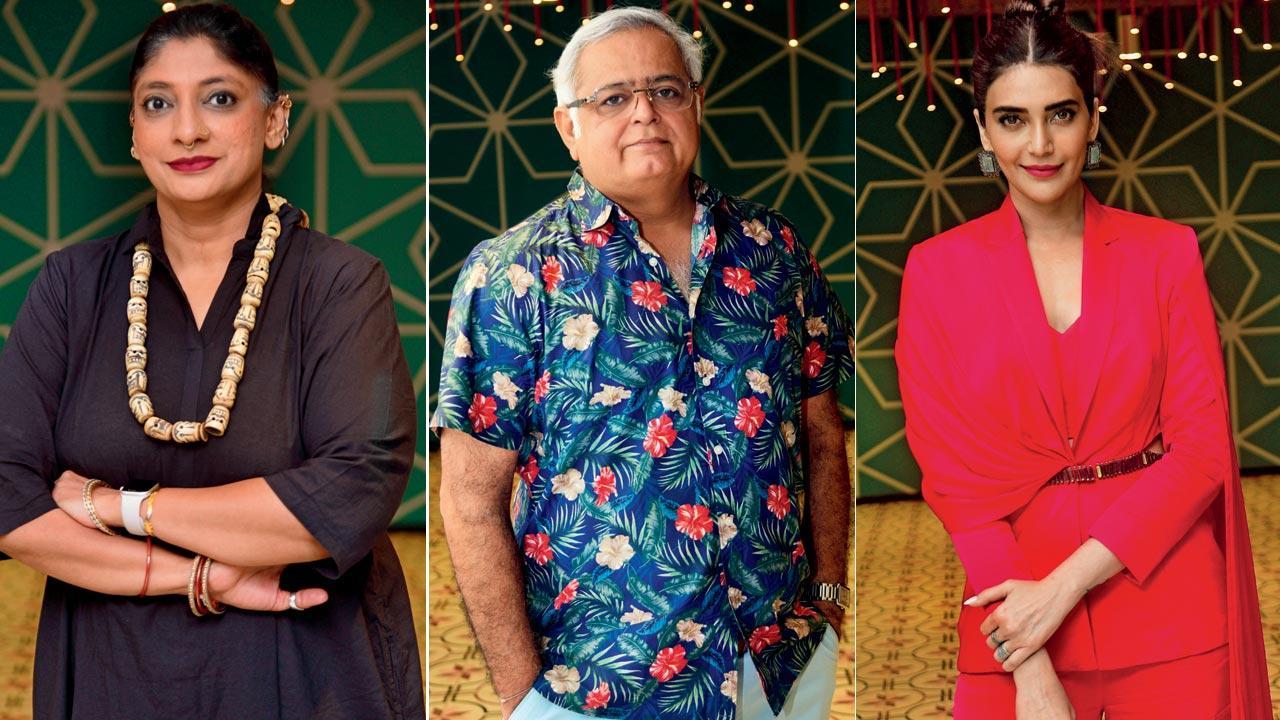
Karishma Tanna plays Jagruti Pathak, inspired by Jigna Vora, in the Hansal Mehta-directed web series Scoop, which follows the 2011 daylight murder of mid-day’s investigations editor Jyotirmoy Dey. Pics/Pradeep Dhivar
To watch on screen an incident so close to home, is unnerving. There’s also mild curiosity, because the characters here are not just actors performing their part; they are living out a reality this writer and several seniors of her former and current newsroom witnessed. Filmmaker Hansal Mehta’s latest Netflix release, Scoop, is that kind of show. Inspired by Jigna Vora’s 2019 memoir, Behind Bars in Byculla: My Days in Prison, the show follows the Mumbai-based crime reporter and former deputy bureau chief of The Asian Age newspaper, as she turns into a suspect in one of the city’s most shocking daylight murders.
ADVERTISEMENT
Vora was key accused in the shooting of mid-day crime and investigation’s editor Jyotirmoy Dey, 56, who was gunned down on June 11, 2011, by four motorcycle-borne men at Hiranandani Gardens, Powai. Chhota Rajan alias Rajan Sadashiv Nikhalje, once a key aide of Dawood Ibrahim, was convicted in 2018 for the murder. He is currently lodged in Tihar jail. Vora, who was accused of trading key information about Dey to Rajan in lieu of a front page interview with the underworld don, was acquitted seven years later in May 2018 for lack of evidence.
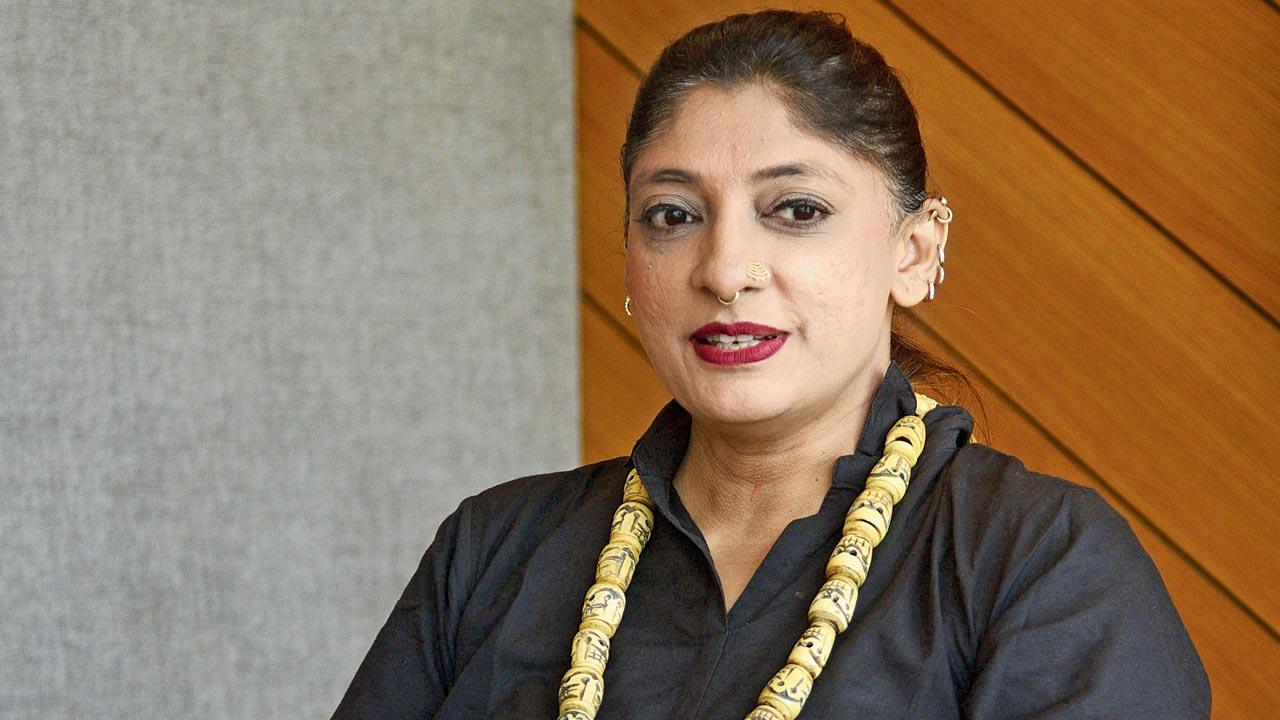 Jigna Vora
Jigna Vora
This writer, a sub-editor with the broadsheet that Vora then worked for, had witnessed first-hand some of the events that Mehta revisits in the prison drama. Like the day Rajan called up on the landline of the newspaper office. The call was put on speaker; we huddled around Vora, as she interviewed him. She filed a page 1 report the following day, with little idea that the hallowed, exclusive article and phone call would be used as evidence against her. The Mumbai police, and later the Central Bureau of Investigation (CBI), alleged that Vora had been in touch with Rajan, “instigating” him into calling for the hit job that killed Dey, then employed with mid-day and considered one of Mumbai’s most celebrated investigative journalists.
When we meet Vora, 48, ahead of the show’s release, her first question is, “Have you watched the show?” She hasn’t caught it yet. “It would mean revisiting the past,” she says nervously, “but I knew that my story was in safe hands.” She is joined by filmmaker Mehta and actor Karishma Tanna, who plays Jagruti Pathak, the character based on Vora.
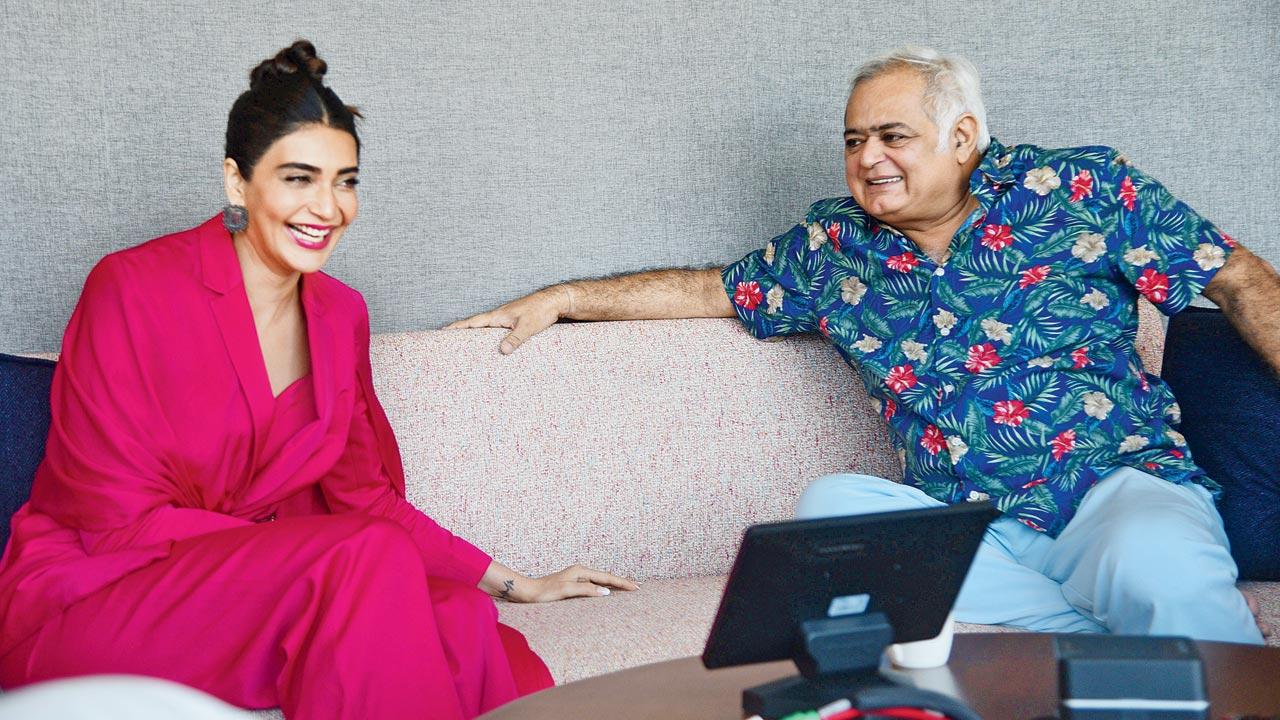 Hansal Mehta directs Karishma Tanna who plays Jagruti Pathak, the show’s protagonist based on former Mumbai-based crime journalist Jigna Vora. Pic/Pradeep Dhivar
Hansal Mehta directs Karishma Tanna who plays Jagruti Pathak, the show’s protagonist based on former Mumbai-based crime journalist Jigna Vora. Pic/Pradeep Dhivar
Mehta was handed Vora’s memoir a few weeks before the pandemic hit in 2020. “I read it, and felt there was a need to go slightly beyond... Jigna had chronicled her days in jail in great detail, but in cinematic terms, until we understand the person and the character, her experiences in prison would not feel rounded,” explains Mehta. He decided that there would be characters they wouldn’t name, and drama they wanted to create. “And that’s the reason I felt there was a need to make a fictionalised version inspired by Jigna’s life.” Although Mehta clarifies that most characters are dramatised versions of people in Vora’s universe—except for Nana, (the alias commonly used by Rajan)—Mumbai’s journalists will recognise a fair number, including Harshvardhan Shroff (an unrecognisable Harman Baweja), inspired by a top cop who was leading the investigation at the time. Bengali film superstar Prosenjit Chatterjee plays Dey in the series.
There was a larger story that Mehta wanted to tell, about aspiration, he says. “She [Vora’s character] wanted a good house, she wanted a better life for her family. It’s the aspiration of every girl living in Mumbai. And yet, because she is a woman, her success was viewed differently, and her aspirations looked upon with suspicion.” This show then is an extension of what Mehta says he has always done, exploring people and their inner worlds. “I didn’t want to make a Wikipedia entry or do a journalist account,” says the director, whose most recent film, Faraaz, was also biographical, and based on the 2016 Dhaka terror attack. “I wanted to capture the hustle of a woman, whose needs were simple, and came under scrutiny when she found herself at the centre of a crime. The bigger question I pose is, ‘Is a woman guilty because she is ambitious? Why should the reporter suddenly become the reported?”
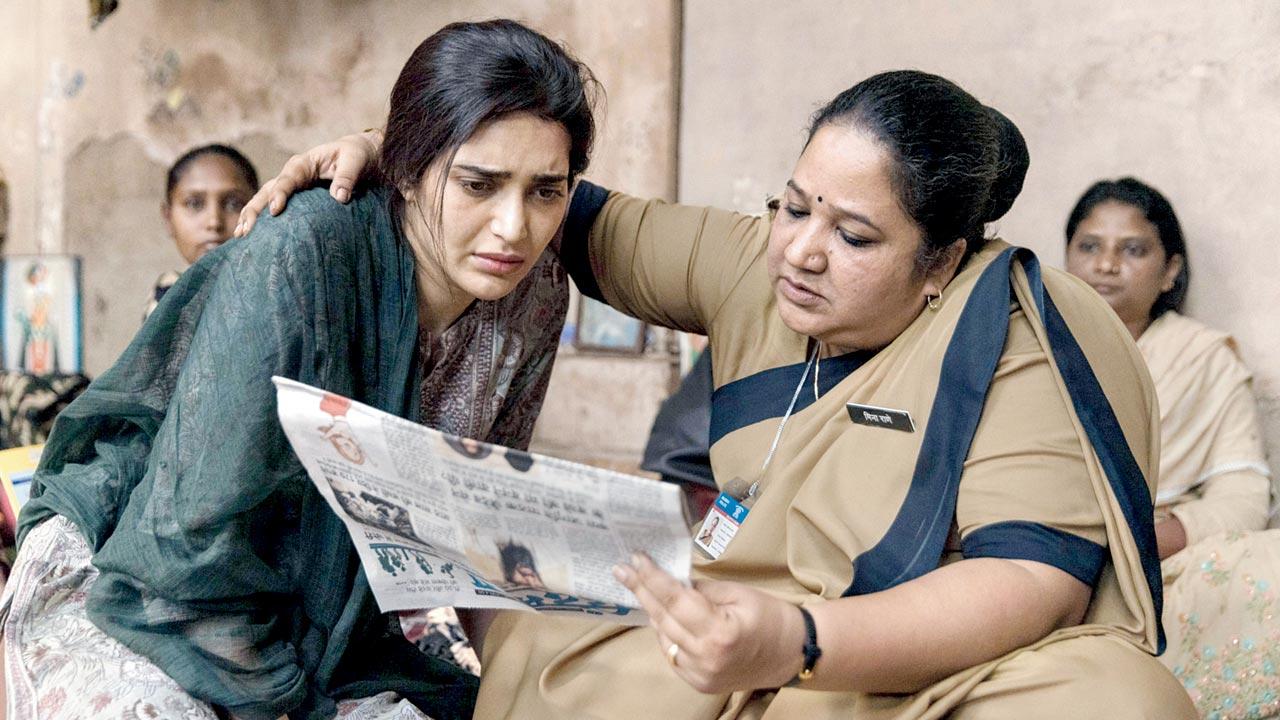 The show is based on Jigna Vora’s memoir, Behind Bars in Byculla: My Days in Prison, which recalls in detail her time at Byculla Women’s Jail
The show is based on Jigna Vora’s memoir, Behind Bars in Byculla: My Days in Prison, which recalls in detail her time at Byculla Women’s Jail
Tanna, he calls, the perfect fit for the role, because she embodied this spirit. A big fan of Mehta’s 2020 web show, Scam 1992, which followed the life of stockbroker Harshad Mehta, she auditioned for the role after casting director Mukesh Chhabra’s team reached out to her. “They didn’t tell me what show this was for, until I reached the venue. When I learnt that it was for Hansal sir’s series, my excitement doubled. After auditioning, I sent him a message.” Mehta breaks in, “She messaged me in Gujarati: ‘Audition karyu, bahu maja aavi [I enjoyed the audition immensely]’.” What struck Mehta most was that Tanna was “hustling even then”. “Her audition wasn’t perfect, but I could see the hunger to prove herself. And that resonated with me.”
Tanna says she was keen to break out of the glamorous image she finds herself typecast in. “I needed a chance to show that I could act as well... when I got the call to say I was in, I was numb.” Playing a character she calls “daunting”, saw her prep by first exploring the world of journalists. As homework, she accompanied a former journalist to a police station, and shadowed a crime reporter. “I observed her body language,” Tanna says of the crime journalist, “how she would talk to the cops.”
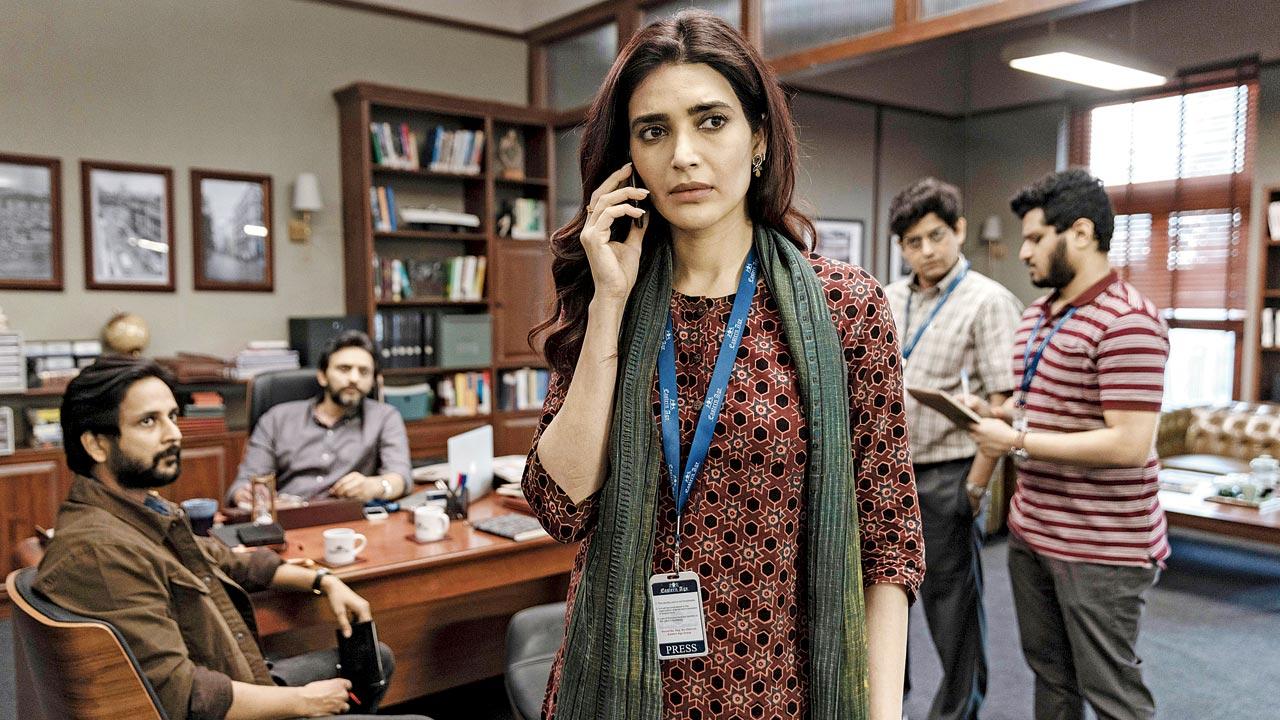 Offering a peak into the world of investigations and journalism, policing and prisons, the show’s story fits the adage, truth is stranger than fiction
Offering a peak into the world of investigations and journalism, policing and prisons, the show’s story fits the adage, truth is stranger than fiction
For the longest time, Mehta deliberately refrained from introducing his cast, including Tanna, to Vora. “I wanted to give them the liberty to interpret Jigna and their relationship with her, rather than mimic her real experiences.” Vora visited them only during the last schedule of the shoot. “And she fed us, and how!” Mehta laughs. “We were shooting in Ghatkopar, quite close to where she lives. For two days straight, Jigna brought along bales of food… aam ras, thepla, karela sabzi. I was in no position to shoot after that,” he laughs. Having the show’s muse on the set was also “overwhelming”. “It was like a member of the family had come to see them,” he shares. Tanna adds, “There was this scene, where Jagruti is with her grandfather; Jigna was standing behind the camera, watching us, crying.”
Vora says Morli Patel, who plays her mother in the series, told her that it felt like she was her own daughter. “Sanat Vyas, who plays my grandfather, was in tears when he met me. It was all very emotional. It felt like I was meeting my real family.” Vora lost her grandparents and her mother,
during the trial.
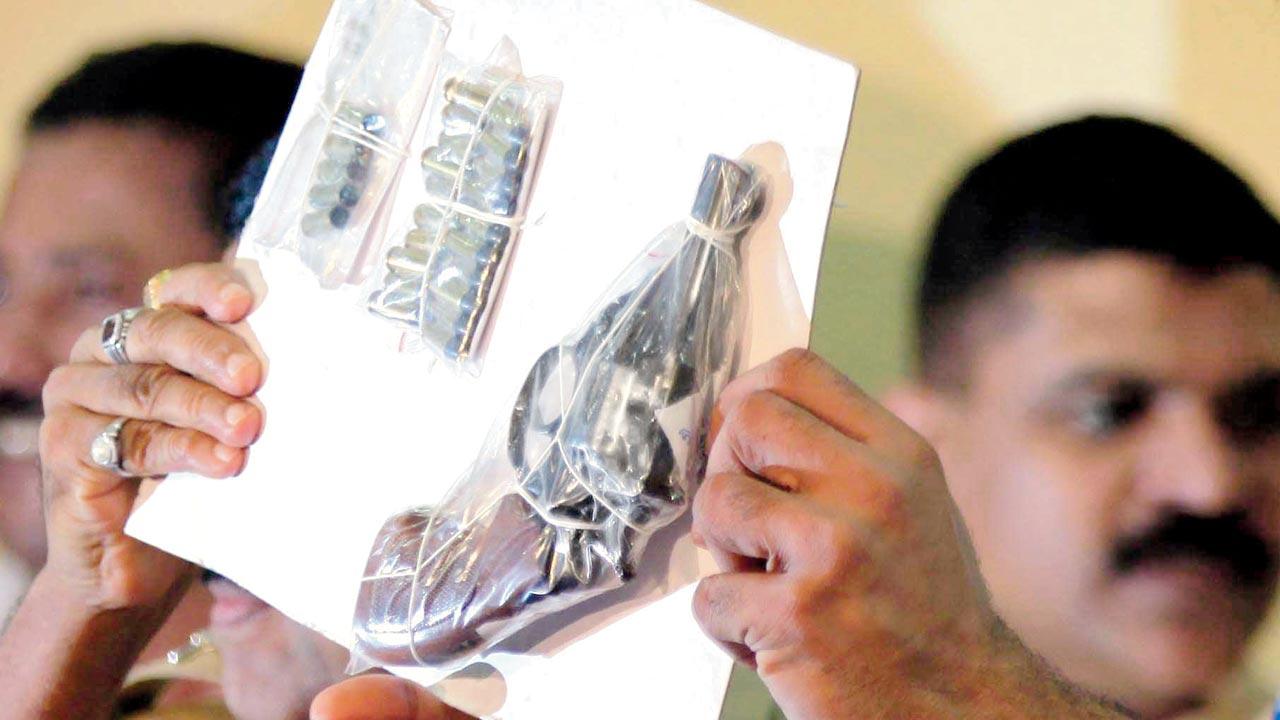 A file photo dated June 27, 2011 of the police holding up the gun used by the shooters to shoot Jyotirmoy Dey during a press conference. Pic/Getty Images
A file photo dated June 27, 2011 of the police holding up the gun used by the shooters to shoot Jyotirmoy Dey during a press conference. Pic/Getty Images
One of the more disturbing experiences from her time at Byculla Women’s Jail, happened on day one, when she was strip-searched by a female constable. “That broke me... I will not forget it. I asked myself repeatedly, ‘why am I going through this, and for what?’ There was a male constable sitting outside while I was being stripped. That night I couldn’t sleep... all I could think was, he must have been laughing.” That scene, admits Tanna, was a difficult one to perform. “It was emotionally draining... I could feel what my character was going through, and how she was misunderstood in jail.”
Despite the launch of a book and a celebrity-ridden show, Vora says, life hasn’t changed all that much in the five years since her acquittal. “I still don’t have a job... society wasn’t supportive. I was judged and unfairly labelled. Even the media...”
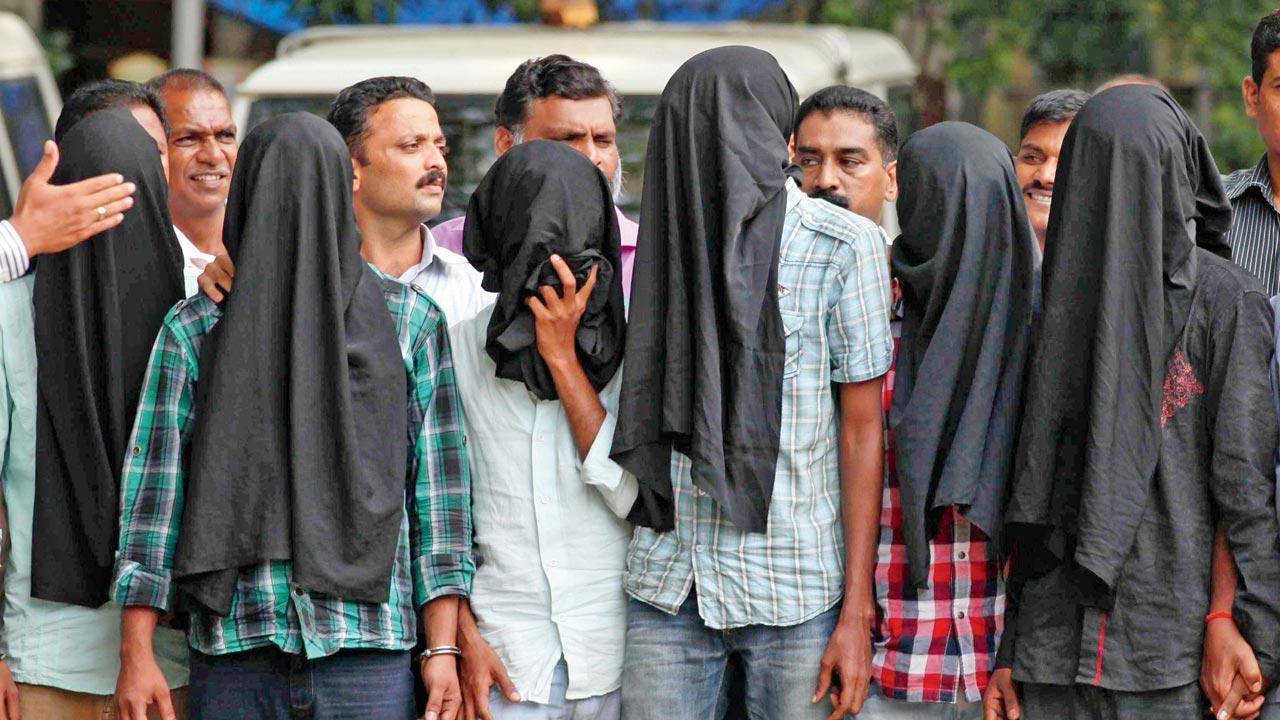 A file photo of the police parading six of the seven accused who were hired to shoot Dey, at the Mumbai Commissioner of Police office. Pic/Getty Images
A file photo of the police parading six of the seven accused who were hired to shoot Dey, at the Mumbai Commissioner of Police office. Pic/Getty Images
To find her own turn against her has made Vora wary of the profession she nurtured and aced. Mainstream press, she said in an exclusive interview to this newspaper after her acquittal, had turned against her. The front-page report that a tabloid ran about a woman journalist’s involvement in Dey’s murder—a sources based article that didn’t include Vora’s version—she called “incriminating”.
“Writing this book was therapy for me. I wanted people to know the truth,” she says. Her son, now 23, had it worse. “He was in class VI when it [the arrest] happened... he was bullied in school, ragged by his classmates. They would tell him that his mother is a murderer. He never believed them, and he never complained. I am fortunate to have him around.” It reminds us of the scene from the show, Pathak giving him a hug when he says, “Maari mummy ek single cockroach pan na maari sake [My mother won’t harm even a cockroach].”
Mehta’s hope is that this show will shine light on the truth. “That is the intention. I want more people to watch it, and judge for themselves what really happened.”
 Subscribe today by clicking the link and stay updated with the latest news!" Click here!
Subscribe today by clicking the link and stay updated with the latest news!" Click here!







